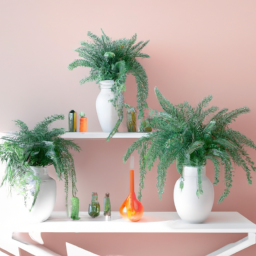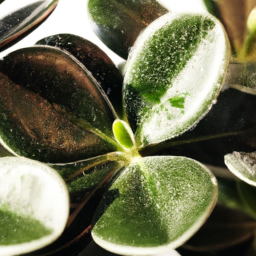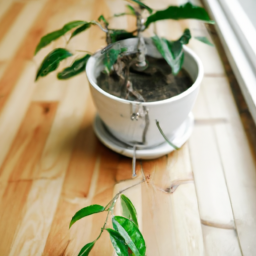
Have you ever considered the benefits of indoor plants for your home or office space? The presence of indoor plants can do wonders for both your physical and mental well-being. From improving air quality to reducing stress levels, there are numerous advantages to incorporating plants into your indoor environment. In this blog post, we will explore the various benefits of indoor plants and how they can enhance your overall quality of life. So, grab a cup of tea and join us as we delve into the world of indoor plants and their positive impact on our daily lives.
Health Benefits of Indoor Plants
Welcome to the wonderful world of indoor plants! Not only do they add beauty and life to your home or office space, but they also offer a wide range of health benefits. In this article, we will explore the various ways in which indoor plants can improve your overall well-being.
Improved Air Quality
One of the most well-known benefits of indoor plants is their ability to purify the air. Plants absorb carbon dioxide and release oxygen through the process of photosynthesis, which helps to freshen up the air in your living or working environment. In addition, certain plants, such as spider plants and peace lilies, can also remove harmful toxins like formaldehyde and benzene from the air, making it cleaner and healthier to breathe.
Studies have shown that indoor plants can reduce indoor air pollution and improve air quality, which can have a positive impact on your respiratory health. By having a few plants strategically placed around your space, you can breathe easier and enjoy a fresher, cleaner atmosphere.
Furthermore, the presence of indoor plants can also help to increase humidity levels in the air, which can be beneficial for those who suffer from dry skin, allergies, or respiratory conditions. Plants release water vapor through a process called transpiration, which can help to maintain optimal moisture levels in the air and prevent dryness.
Stress Reduction
In today’s fast-paced world, stress has become a common issue for many people. However, the presence of indoor plants can help to create a more calming and relaxing environment, which can in turn reduce stress levels and promote a sense of well-being. Studies have shown that simply being around plants can have a soothing effect on the mind and body, helping to lower blood pressure and heart rate.
Indoor plants can also help to improve mental health by promoting feelings of happiness and positivity. The act of caring for plants and watching them grow can be a therapeutic and rewarding experience, providing a sense of accomplishment and purpose. In addition, the color green, which is abundant in plants, has been shown to have a calming and rejuvenating effect on the mind, helping to reduce anxiety and improve mood.
By incorporating indoor plants into your living or working space, you can create a peaceful and harmonious atmosphere that promotes relaxation and well-being. Whether it’s a lush fern in the corner of your living room or a colorful orchid on your desk, plants can help to create a sanctuary of serenity in the midst of a hectic world.
Boosted Immunity
Believe it or not, indoor plants can also help to boost your immune system and keep you healthy. Plants have been shown to reduce the levels of airborne bacteria and viruses in indoor spaces, which can help to prevent the spread of illnesses and infections. In addition, the presence of plants can also help to increase humidity levels in the air, which can keep mucous membranes moist and more resistant to pathogens.
Furthermore, certain plants, such as aloe vera and eucalyptus, have natural antibacterial and antiviral properties that can help to purify the air and fight off germs. By having these plants in your home or office, you can create a healthier environment that supports your body’s natural defenses against illness.
Overall, indoor plants offer a wide range of health benefits that can improve your physical, mental, and emotional well-being. By incorporating plants into your indoor space, you can enjoy cleaner air, reduced stress, and a stronger immune system. So go ahead and bring some greenery into your life – your body and mind will thank you!
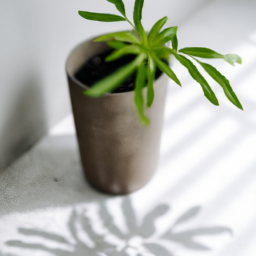
Improving Air Quality with Indoor Plants
Introduction
Indoor plants are not just a beautiful addition to your home decor; they also offer numerous health benefits, including improving air quality. In today’s world, where air pollution is a major concern, having indoor plants can help purify the air inside your home and create a healthier environment for you and your family. In this article, we will explore the various ways in which indoor plants can improve air quality and enhance your overall well-being.
How Indoor Plants Improve Air Quality
One of the primary ways in which indoor plants help improve air quality is through the process of photosynthesis. Plants take in carbon dioxide from the air and release oxygen during photosynthesis, which helps increase the oxygen levels in your home. This can help reduce the symptoms of respiratory conditions such as asthma and allergies, as well as improve overall lung function.
In addition to releasing oxygen, indoor plants also act as natural air purifiers. They can absorb harmful toxins and pollutants from the air, such as formaldehyde, benzene, and trichloroethylene, which are commonly found in household items like cleaning products, furniture, and carpets. By removing these toxins from the air, indoor plants can help reduce the risk of respiratory illnesses and other health issues caused by indoor air pollution.
Furthermore, indoor plants can help increase humidity levels in your home, which can be beneficial for your respiratory health. Dry indoor air can irritate the throat and nasal passages, leading to symptoms like coughing, sore throat, and congestion. By releasing water vapor through a process called transpiration, plants can help maintain optimal humidity levels in your home and alleviate these symptoms.
In summary, indoor plants improve air quality by releasing oxygen, absorbing toxins, and increasing humidity levels in your home. By incorporating plants into your indoor space, you can create a healthier environment for yourself and your loved ones.
Choosing the Right Indoor Plants
When selecting indoor plants for air purification, it’s essential to choose varieties that are known for their air-purifying properties. Some popular options include spider plants, snake plants, peace lilies, and pothos. These plants are not only easy to care for but also highly effective at removing toxins from the air.
In addition to choosing the right plants, it’s crucial to consider the size of your space when deciding how many plants to incorporate. As a general rule of thumb, aim to have at least one medium-sized plant per 100 square feet of space to experience the full benefits of air purification.
Lastly, make sure to place your indoor plants in well-lit areas where they can thrive and effectively purify the air. Consider placing plants near windows or using grow lights to ensure they receive an adequate amount of sunlight for photosynthesis.
In conclusion, selecting the right indoor plants and placing them in well-lit areas are essential steps in improving air quality in your home. By following these guidelines, you can create a healthier and more inviting indoor environment for yourself and your family.
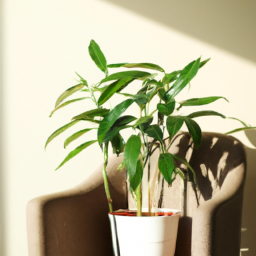
The Importance of Indoor Plants for Mental Health
Reducing Stress and Anxiety
Indoor plants have been shown to have a calming effect on individuals, reducing stress and anxiety levels. The presence of greenery in indoor spaces can help create a sense of tranquility and relaxation, which can be beneficial for those dealing with high levels of stress or anxiety. Studies have shown that simply being around plants can lower cortisol levels, the hormone associated with stress.
In addition, caring for indoor plants can also be a therapeutic activity for many people. The act of nurturing and tending to plants can provide a sense of purpose and accomplishment, which can help improve mood and reduce feelings of anxiety.
Overall, having indoor plants in your home or office can create a more peaceful and stress-free environment, promoting better mental health and well-being.
Improving Air Quality
Indoor plants are not only aesthetically pleasing, but they also play a crucial role in improving air quality. Plants absorb carbon dioxide and release oxygen through the process of photosynthesis, helping to purify the air we breathe. This can have a direct impact on our mental health, as clean air has been linked to improved cognitive function and mood.
Furthermore, certain indoor plants have the ability to remove harmful toxins from the air, such as formaldehyde and benzene, which are commonly found in indoor environments. By reducing the levels of these pollutants, indoor plants can help create a healthier and more conducive space for mental well-being.
By incorporating indoor plants into your living or working space, you can enjoy cleaner and fresher air, leading to improved mental clarity and overall mood.
Promoting Relaxation and Positive Vibes
The presence of indoor plants can also help promote relaxation and positive vibes in indoor spaces. The natural colors and textures of plants can create a soothing and inviting atmosphere, making the environment more welcoming and comfortable.
In addition, studies have shown that being surrounded by nature, even in the form of indoor plants, can have a positive impact on mood and mental health. The sight of greenery and the connection to the natural world can evoke feelings of happiness and well-being, helping to reduce feelings of depression and anxiety.
By incorporating a variety of indoor plants into your home or office, you can create a peaceful and uplifting environment that fosters relaxation and positivity, ultimately benefiting your mental health.
Let’s bring it all home
Indoor plants do more than just add a touch of greenery to your living space – they also come with a host of benefits for your health and well-being. Studies have shown that having plants indoors can help reduce stress, boost mood, and improve air quality. The simple act of caring for a plant can also provide a sense of purpose and responsibility, which can be especially beneficial during times of uncertainty or stress.
In addition to their mental health benefits, indoor plants can also help purify the air in your home by removing toxins and increasing oxygen levels. Certain plants, such as aloe vera and spider plants, are particularly effective at filtering out harmful chemicals commonly found in indoor environments. So, not only do indoor plants look beautiful and add a natural element to your decor, but they can also have a positive impact on your overall health and well-being.
Top FAQs:
Q1. What are the benefits of having indoor plants?
Having indoor plants can improve air quality by absorbing toxins and releasing oxygen. They also add a touch of nature to your living space, reduce stress levels, and can even boost productivity.
Q2. Do indoor plants help with mental health?
Yes, indoor plants have been shown to have a positive impact on mental health. They can help reduce anxiety, improve mood, and create a sense of calm and relaxation in your home or office.
Q3. How do indoor plants contribute to better air quality?
Indoor plants can help remove toxins such as formaldehyde, benzene, and trichloroethylene from the air through a process called phytoremediation. They absorb these harmful substances and release clean oxygen, improving the overall air quality in your space.
Q4. Can indoor plants improve productivity?
Yes, studies have shown that having indoor plants in the workplace can boost productivity and creativity. The presence of plants can help reduce stress, increase focus, and create a more pleasant work environment, ultimately leading to higher productivity levels.
Q5. What are some low-maintenance indoor plants for beginners?
If you’re new to caring for indoor plants, some easy-to-care-for options include pothos, snake plants, spider plants, and peace lilies. These plants require minimal attention and can thrive in a variety of indoor environments.
Dr. Olivia Green is a botanist with over two decades of experience in indoor plant cultivation. She holds a Ph.D. in Plant Biology and has dedicated her career to researching plant behavior in controlled environments. Dr. Green is passionate about helping plant enthusiasts master the art of indoor gardening through her extensive knowledge and practical insights.

